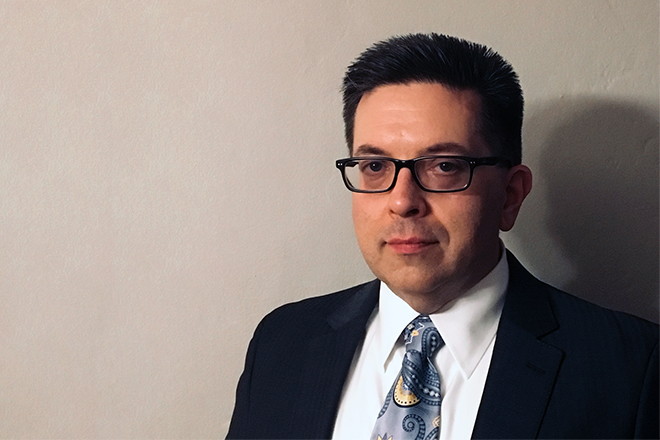
Edward Paine delivers justice for victims of serious vehicular crimes
The best part about prosecution for Edward Paine, L’99, is delivering justice for victims.
“Trying to get justice for victims within the system that we have, when we can – that brings me pleasure,” he said.
Paine is a deputy county attorney in the Vehicular Crimes Bureau at the Maricopa County Attorney’s Office in Phoenix. He prosecutes crimes involving motor vehicle collisions and incidents in which drivers are found to be driving recklessly or under the influence of alcohol or illegal drugs.
Vehicular Crimes Bureau employees are on call 24 hours a day to assist law enforcement officers with fatal accident investigations.
“It’s been a real eye-opener going to the scenes of crashes and seeing how dangerous vehicles can be in the hands of someone who is driving recklessly, either through speeding or being impaired by alcohol or drugs,” Paine said.
Although he has worked on vehicular crimes for the past six years, Paine’s focus has varied over the course of a prosecutorial career that has taken him from the Arizona Attorney General’s Office to the city of Surprise, Arizona, and two different Native American communities. He served as assistant prosecutor for the Ak-Chin Indian Community and chief prosecutor for the Gila River Indian Community – jobs that drew upon his specialized training at KU Law.
Paine discovered his love for tribal law after taking a legal writing course from former KU Law Professor Robert Porter, founding director of the school’s Tribal Law & Government Center. Porter encouraged Paine to take classes in tribal law, and he graduated from KU with a Tribal Lawyer Certificate – paving the way for a career in the field.
“Studying tribal law convinced me that there were so many communities across the country that were deeply in need of attorneys from all different walks of life dedicated to seeking justice and promoting safety,” Paine said. “It was a privilege to serve Ak-Chin and Gila River, and I don’t think I would have gotten those two jobs in Arizona without the knowledge that I gained through tribal law courses at KU.”
Regardless of the practice area, some challenges and opportunities in litigation are universal. Rising caseloads present a difficult juggling act, Paine said. And evolving demographics have altered courtroom presentation. As more millennials enter the jury pool, Paine said, expectations for audio or video components at trial have increased.
“We use a lot of technology in the courtroom during our opening statements, when witnesses are testifying and during closing arguments,” he said. “You kind of appeal to jurors, all of their senses.”
In that regard, Paine likens his role to that of a play director.
“I enjoy trying to orchestrate everything,” he said. “As a trial lawyer, it is kind of like putting on a play for the jury. You have to determine who your best actors are in terms of your witnesses and make sure that they’re prepared. You have to make sure you’re calling witnesses to prove various elements of your case. You have to select the best photos.”
These skills were crucial during a case in which a mother lost a second child to an impaired driver. Through Paine’s careful orchestration of witnesses and evidence, the defendant was convicted and will “likely spend the rest of his life in prison.”
“I can’t even imagine the pain that she went through having lost one daughter to a drunk driver, but then she lost another child to a drunk driver,” Paine said. “It was devastating for the family to go through that process again.”
Throughout all the roles Paine has held, his favorite part of prosecution is holding defendants accountable for their actions.
“It’s challenging and it takes a lot of time, but I do enjoy that aspect of it,” Paine said. “I am pleased when I am able to get at least a measure of justice.”
— By Ashley Hocking